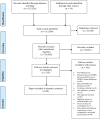Crossing cultural divides: A qualitative systematic review of factors influencing the provision of healthcare related to female genital mutilation from the perspective of health professionals
- PMID: 30830904
- PMCID: PMC6398829
- DOI: 10.1371/journal.pone.0211829
Crossing cultural divides: A qualitative systematic review of factors influencing the provision of healthcare related to female genital mutilation from the perspective of health professionals
Abstract
Introduction: As a result of global migration, health professionals in destination countries are increasingly being called upon to provide care for women and girls who have experienced female genital mutilation/cutting (FGM/C). There is considerable evidence to suggest that their care experiences are sub-optimal. This systematic review sought to illuminate possible reasons for this by exploring the views, experiences, barriers and facilitators to providing FGM-related healthcare in high income countries, from health professionals' perspectives.
Methods: Sixteen electronic databases/resources were searched from inception to December 2017, supplemented by reference list searching and suggestions from experts. Inclusion criteria were: qualitative studies (including grey literature) of any design, any cadre of health worker, from OECD countries, of any date and any language. Two reviewers undertook screening, selection, quality appraisal and data extraction using tools from the Joanna Briggs Institute (JBI). Synthesis involved an inductive thematic approach to identify descriptive themes and interpret these into higher order analytical constructs. Confidence in the review findings was assessed using GRADE-CERQual. The review protocol was registered with PROSPERO (CRD420150300042015).
Results: Thirty papers (representing 28 distinct studies) from nine different countries were included. The majority of studies focused on maternity contexts. No studies specifically examined health professionals' role in FGM/C prevention/safeguarding. There were 20 descriptive themes summarised into six analytical themes that highlighted factors perceived to influence care: knowledge and training, communication, cultural (mis)understandings, identification of FGM/C, clinical management practices and service configuration. Together, these inter-linked themes illuminate the ways in which confidence, communication and competence at provider level and the existence and enactment of pathways, protocols and specialist support at service/system level facilitate or hinder care.
Conclusions: FGM/C is a complex and culturally shaped phenomenon. In order to work effectively across cultural divides, there is a need for provider training, clear guidelines, care pathways and specialist FGM/C centres to support mainstream services.
Conflict of interest statement
The authors have declared that no competing interests exist.
Similar articles
-
Improving care for women and girls who have undergone female genital mutilation/cutting: qualitative systematic reviews.Southampton (UK): NIHR Journals Library; 2019 Sep. Southampton (UK): NIHR Journals Library; 2019 Sep. PMID: 31532598 Free Books & Documents. Review.
-
Seeking culturally safe care: a qualitative systematic review of the healthcare experiences of women and girls who have undergone female genital mutilation/cutting.BMJ Open. 2019 May 29;9(5):e027452. doi: 10.1136/bmjopen-2018-027452. BMJ Open. 2019. PMID: 31147364 Free PMC article.
-
What are the experiences of seeking, receiving and providing FGM-related healthcare? Perspectives of health professionals and women/girls who have undergone FGM: protocol for a systematic review of qualitative evidence.BMJ Open. 2017 Dec 14;7(12):e018170. doi: 10.1136/bmjopen-2017-018170. BMJ Open. 2017. PMID: 29247096 Free PMC article.
-
Provision and uptake of routine antenatal services: a qualitative evidence synthesis.Cochrane Database Syst Rev. 2019 Jun 12;6(6):CD012392. doi: 10.1002/14651858.CD012392.pub2. Cochrane Database Syst Rev. 2019. PMID: 31194903 Free PMC article.
-
Views of female genital mutilation survivors, men and health-care professionals on timing of deinfibulation surgery and NHS service provision: qualitative FGM Sister Study.Health Technol Assess. 2023 Mar;27(3):1-113. doi: 10.3310/JHWE4771. Health Technol Assess. 2023. PMID: 36946235 Free PMC article.
Cited by
-
Strengthening woman-centred care for pregnant women with female genital mutilation in Australia: a qualitative muti-method study.Front Glob Womens Health. 2024 Jan 16;5:1248562. doi: 10.3389/fgwh.2024.1248562. eCollection 2024. Front Glob Womens Health. 2024. PMID: 38304041 Free PMC article.
-
Woman and girl-centred care for those affected by female genital mutilation: a scoping review of provider tools and guidelines.Reprod Health. 2022 Feb 22;19(1):50. doi: 10.1186/s12978-022-01356-3. Reprod Health. 2022. PMID: 35193606 Free PMC article.
-
Supporting patients with female genital mutilation in primary care: a qualitative study exploring the perspectives of GPs' working in England.Br J Gen Pract. 2020 Oct 1;70(699):e749-e756. doi: 10.3399/bjgp20X712637. Print 2020 Oct. Br J Gen Pract. 2020. PMID: 32958532 Free PMC article.
-
Sculptors of African Women's Bodies: Forces Reshaping the Embodiment of Female Genital Cutting in the West.Arch Sex Behav. 2021 Jul;50(5):1949-1957. doi: 10.1007/s10508-020-01710-1. Epub 2020 Apr 23. Arch Sex Behav. 2021. PMID: 32328914 Free PMC article. No abstract available.
-
A system analysis of the mental health services in Norway and its availability to women with female genital mutilation.PLoS One. 2020 Nov 4;15(11):e0241194. doi: 10.1371/journal.pone.0241194. eCollection 2020. PLoS One. 2020. PMID: 33147265 Free PMC article.
References
-
- United Nations Children’s Fund. Female Genital Mutilation/Cutting: A Global Concern. New York: UNICEF; 2016.
-
- WHO. Female Genital Mutilation: Fact Sheet. Geneva: World Health Organisation; 2014.
-
- WHO. Culture matters: using a cultural contexts of health approach to enhance policy-making. Geneva: World Health Organisation (Europe Region); 2017.
-
- Phillimore J, Klaas F, Padilla B, Hernandez-Plaza S, Rodrigues V. Adaptation of Health Services to Diversity: An Overview of Approaches, Working Paper No.15. University of Birmingham: Institute for Research into Superdiversity; 2016.
Publication types
MeSH terms
Grants and funding
LinkOut - more resources
Full Text Sources
Research Materials


